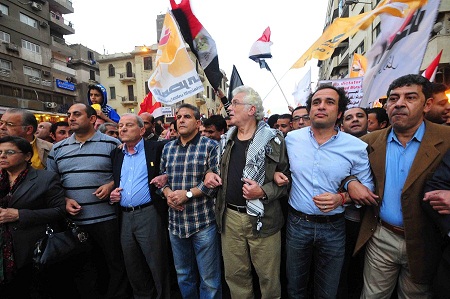NEW YORK: After eight years of misguided policy by the Bush administration in the Middle East, the time is overdue for an enlightened strategy to tackle the region’s woes. This must include an approach that will bring hope to a region shattered by violence, consumed by conflict and division and filled with disdain toward the United States. Although the massive economic crisis facing America is and should be President-elect Obama’s first priority, he must not hesitate to confront the simmering conflicts in the Middle East that cannot be relegated to the back burner without severely undermining the strategic interest and security of the United States and its allies.
Mr Obama faces an incredible challenge to end the wars in Iraq and Afghanistan honorably, to restore hope to the Palestinian people, and to engage Iran and Syria constructively while fostering regional economic development. These are daunting tasks that may take several years to accomplish but must, nevertheless, be tackled no matter how impossible they may seem. Mr Obama’s promise for change must be implemented not only with the goal of restoring America’s credibility and moral leadership abroad, but also with the intention to serve the United States’ strategic interests and prevent a potentially major regional conflagration. America’s new strategy in the Middle East must be comprehensive and integrated, utilizing all of America’s diplomatic instruments and power while working with allies. While the United States must take the lead, it must also commit itself to a strategy of multilateralism working with other powers to orchestrate solutions to some of the most intractable conflicts that America alone simply cannot solve. The new American strategy in the Middle East must be developed with an eye on establishing comprehensive regional security in which the majority of, if not all, the states in the area will have a stake in maintaining.
In Iraq, the new administration must remain committed to withdrawing most of the American forces within 16 months as envisioned by President-elect Obama, but with some flexibility provided that three critical criteria are first met. The Iraqi internal forces and the military first must be well-integrated and trained to maintain internal security and order. Secondly, it is important that the Sunnis are provided with the means to defend themselves and run their own internal affairs as they see fit akin to their Kurdish counterpart.
Lastly, an oil law must be enacted providing for equitable distribution of oil revenue to all Iraqis.
By pursuing these three objectives and aided by the lull in violence brought about by the surge of American forces, the Iraqis themselves will be more inclined to agree on political reforms and reconciliation. In addition, the United States should actively seek the involvements of Iraq’s neighbors, especially Syria, Saudi Arabia, Turkey and Jordan who have stakes in Iraq’s stability and a strong desire to bridge the Sunni-Shia divide. Anything short of that would reverse much of the progress made to date, except this time with far greater intensity than ever before as American residual forces will be unable to prevent renewed violence. America has a moral obligation to leave Iraq reasonably assured of sustainable security and political stability. That much we owe the Iraqi people and the Obama administration must not settle for less.
In dealing with Iran, the new administration must create a strategy based on engagement and deterrence to prevent Iran from continuing to enrich uranium with impunity. The United States must initiate direct talks with Iran and end the threat of regime change in Tehran while making it abundantly clear that a nuclear Iran is not an option. This can be accomplished by pursuing three tracks of separate but interconnected negotiations. The first track should focus on negotiating an end to Iran’s enrichment of uranium without preconditions, and what would be the economic incentive package provided in return. The United States should take the lead in these negotiations joined by its European allies along with China and Russia. The negotiations should be limited to three month period to prevent Iran from playing for time. The second track ought to focus on Iran’s and the United States’ grievances against each other.
By constructively engaging Iran, Washington will help build mutual confidence, spur progress on the first negotiating track, benefit bilateral relations and encourage Iranian reformers to pursue democratic change without fear of retribution. The third negotiating track should concentrate on regional security to alleviate Iran’s national security concerns and reinforce the United States’ commitments to the protection of its allies in the region.
Should Iran, nevertheless, insist on continuing the enrichment of uranium, the United States must be clear about the extent of the devastating sanctions that will be orchestrated against it while not ruling out the use of force as a last resort. The United States must spearhead all three tracks without which future talks will be as elusive as the previous negotiations, except this time the West and Israel will be facing the unsettling prospect of a nuclear Iran with potentially dreadful consequences.
These tasks will require serious engagement not only with state-actors, but with governing and organizational forces that must be bolstered such as the United Nations, the World Bank, the Arab League, the Global 8, and the Gulf Cooperation Council. The next administration must create policies committed to the overall strengthening of collective moderate forces, as the US can no longer afford to take on the toughest problems alone in a globalized world. While the tasks ahead are daunting and by no account can be accomplished in one term, success for the new American administration will be defined by its outreach and willingness to participate and lead in a process of global engagement. To solve the many crises of the Middle East, President Obama must commit to policies and people capable of tackling each issue relentlessly.
Alon Ben-Meir is senior fellow at the Center for Global Affairs, NYU. He teaches courses on the Middle East and international negotiations.


